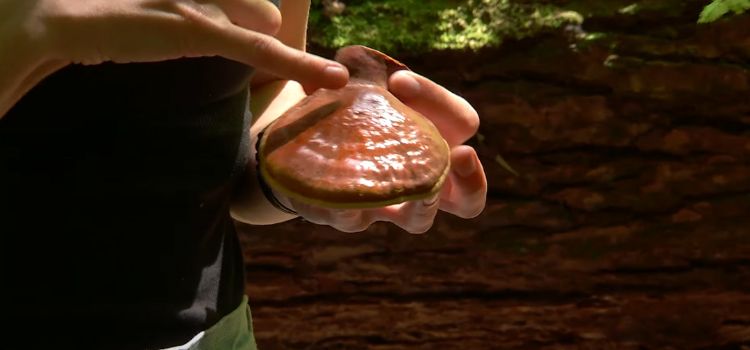
No, it is not recommended to take Reishi mushrooms while breastfeeding.
The Reishi Mushroom And Breastfeeding
Reishi mushroom supplements, including mushroom coffee, capsules, and fortified foods, are generally considered safe while breastfeeding. However, it’s important to ensure that the mushrooms were foraged by professionals.

The Growing Popularity Of Reishi Mushrooms
- Reishi mushrooms, also known as Ganoderma lucidum, have been used for centuries in traditional Chinese medicine for their potential health benefits.
- In recent years, these mushrooms have gained popularity in the Western world due to their powerful medicinal properties.
- Reishi mushrooms are touted for their ability to support immune function, reduce inflammation, promote relaxation, and improve overall well-being.
- As a result, many people are incorporating Reishi mushrooms into their daily routine, including breastfeeding mothers.
Unique Properties Of Reishi Mushrooms
- Reishi mushrooms contain various bioactive compounds that contribute to their health benefits.
- These compounds include triterpenoids, polysaccharides, and antioxidants, which have anti-inflammatory, antioxidant, and immune-enhancing properties.
- Reishi mushrooms are also known for their adaptogenic properties, helping the body adapt to stress and promote a sense of calm and relaxation.
- Additionally, Reishi mushrooms have been studied for their potential anti-cancer and liver-protective effects.
Reishi Mushroom Consumption During Breastfeeding
- While Reishi mushrooms offer many potential health benefits, it is important to consider their safety during breastfeeding.
- Limited research is available on the effects of Reishi mushroom consumption specifically during breastfeeding.
- It is generally recommended to exercise caution and consult with a healthcare professional before introducing Reishi mushrooms into your breastfeeding routine.
- Factors such as the quality and source of the mushrooms, individual health conditions, and potential interactions with other medications should be taken into consideration.
- If you are considering Reishi mushroom consumption while breastfeeding, it is advisable to choose reputable, high-quality products and consume them in moderation.
Remember, always prioritize the health and well-being of both you and your child when making decisions about dietary supplements during breastfeeding. Consult with a healthcare professional to ensure the safety and appropriateness of incorporating Reishi mushrooms into your regimen.
What Makes Reishi Mushroom Safe For Breastfeeding?

While breastfeeding, it is safe to consume mushroom supplements, including reishi, as long as they are sourced from professionals. However, there is limited data on the safety of reishi mushrooms specifically for pregnant or breastfeeding women, so caution is advised.
Nutritional Benefits Of Reishi Mushrooms
- Reishi mushrooms are a rich source of vitamins, minerals, and antioxidants that can support overall health and well-being.
- They contain compounds like polysaccharides and triterpenoids, which have potential immune-boosting and anti-inflammatory properties.
- Reishi mushrooms are low in calories and fat, making them a nutritious addition to a breastfeeding diet.
Lack Of Harmful Substances In Reishi Mushrooms
- Reishi mushrooms are generally considered safe for consumption and do not contain harmful substances or toxins.
- They undergo rigorous testing and quality control measures to ensure their safety.
- Reishi mushrooms are naturally grown and harvested, making them a safe choice for breastfeeding mothers.
Studies On The Safety Of Reishi Mushrooms During Breastfeeding
- While there is limited research specifically on the safety of Reishi mushrooms during breastfeeding, studies on their general safety profile show promising results.
- Animal studies suggest that Reishi mushrooms do not have any adverse effects on lactation or the development of breastfed infants.
- However, more research is needed to determine the exact safety and potential benefits of Reishi mushrooms for breastfeeding mothers.
It’s important to note that individual circumstances may vary, and it’s always recommended to consult with a healthcare professional before incorporating any new supplements or foods into your breastfeeding diet.
Potential Risks And Side Effects Of Reishi Mushroom During Breastfeeding
Reishi mushrooms may pose potential risks and side effects during breastfeeding. It is recommended to avoid taking Reishi mushrooms while breastfeeding due to a lack of sufficient research on their safety in this specific circumstance.
Reishi mushroom has gained popularity for its potential health benefits, including immune support and stress reduction. However, when it comes to breastfeeding mothers, it’s essential to consider the potential risks and side effects associated with consuming reishi mushrooms.
Here are some important points to keep in mind:
Possible Allergic Reactions
- Allergies to mushrooms: If you or your baby have a known allergy to mushrooms, it’s best to avoid reishi mushrooms or any mushroom-based supplements.
- Skin rashes or itching: In some cases, individuals may develop allergic reactions such as skin rashes or itching after consuming reishi mushrooms.
Interactions With Medications
- Blood-thinning medications: Reishi mushrooms may potentially increase the risk of bleeding, so if you’re taking blood-thinning medications, it’s crucial to consult with your healthcare provider before incorporating reishi into your diet.
- Antidiabetic medications: Reishi mushrooms may lower blood sugar levels, so if you’re taking antidiabetic medications, monitoring your blood sugar levels closely is necessary.
Dosage Considerations For Breastfeeding Mothers
- As there is limited research on the effects of reishi mushroom specifically in breastfeeding women, it is generally recommended to err on the side of caution and avoid high doses or concentrated forms of reishi mushroom supplements.
- If you still want to consume reishi mushrooms while breastfeeding, it’s advisable to opt for culinary uses, such as including cooked reishi mushrooms in your meals, rather than relying on supplements.
Remember, it’s always crucial to consult with your healthcare provider or a registered herbalist before introducing any new supplements or herbs into your diet, especially while breastfeeding. They can provide personalized advice and help you make informed decisions about what is best for you and your baby.
Guidelines For Safely Consuming Reishi Mushroom While Breastfeeding

While there is limited data on the safety of consuming Reishi mushrooms during breastfeeding, it is generally recommended to avoid them.
Reishi mushrooms have gained popularity for their potential health benefits, but as a breastfeeding mother, it’s important to exercise caution when considering the consumption of Reishi mushroom products.
To ensure the safety of both you and your baby, follow these guidelines:
Consultation With A Healthcare Provider
Before incorporating Reishi mushrooms into your diet while breastfeeding, it is crucial to consult with your healthcare provider. They can provide personalized advice based on your specific health conditions, medications, and breastfeeding journey.
A healthcare professional will assess any potential risks and guide you on whether it is safe for you to consume Reishi mushrooms while breastfeeding.
- Schedule an appointment with your healthcare provider, preferably someone knowledgeable about herbal supplements and breastfeeding.
- Discuss your desire to consume Reishi mushrooms and any concerns you may have.
- Seek guidance on potential risks, drug interactions, and any specific precautions to take.
Choosing High-Quality Reishi Mushroom Products
Selecting high-quality Reishi mushroom products is vital to ensure their safety and effectiveness. Here are some tips to help you make the right choice.
- Look for Reishi mushroom products from reputable brands that adhere to good manufacturing practices.
- Opt for organic Reishi mushrooms as they are less likely to contain harmful pesticides or herbicides.
- Check for third-party testing and certifications to guarantee the purity and quality of the product.
- Avoid products that contain additives, fillers, or unnecessary ingredients.
Proper Dosage And Frequency Of Consumption
When it comes to consuming Reishi mushrooms while breastfeeding, it’s crucial to follow the proper dosage and frequency recommendations. These guidelines will help ensure you are consuming the right amount without posing any harm to your baby.
- Start with a low dosage and gradually increase if necessary, paying close attention to how your body and baby respond.
- Follow the dosage instructions provided by the manufacturer or as recommended by your healthcare provider.
- Do not exceed the recommended dosage, as excessive consumption may lead to unwanted side effects.
- Monitor yourself and your baby for any adverse reactions, and discontinue use if any concerns arise.
Is Reishi Really Safe While Breastfeeding?
Reishi mushrooms, such as lion’s mane, turkey tail, and cordyceps, are generally safe to consume while breastfeeding, as long as they have been foraged by professionals. Mushroom supplements and foods fortified with mushrooms are also considered safe for breastfeeding mothers.
However, it is advised to avoid high doses of reishi mushrooms if you have bleeding disorders or are planning to undergo surgery.
Uncovering The Truth And Dispelling Misconceptions
- Reishi mushroom, also known as Ganoderma lucidum, has been used for centuries in traditional Eastern medicine for its potential health benefits.
- There are several misconceptions surrounding the safety of consuming reishi mushrooms while breastfeeding.
- However, scientific research suggests that reishi mushrooms are generally safe for consumption during breastfeeding when taken in moderate amounts.
- Reishi mushrooms are rich in antioxidants, which can help boost the immune system and reduce inflammation.
- They are also believed to have adaptogenic properties, meaning they may help the body adapt to stress and support overall well-being.
- Despite these potential benefits, it is important to note that more research is needed to fully understand the effects of reishi mushrooms on breastfeeding women and their infants.
- It is always recommended to consult with a healthcare professional before incorporating any new supplement or food into your diet while breastfeeding.
Ensuring Safe And Informed Decision Making
- While reishi mushrooms are generally considered safe, it is crucial to exercise caution and make an informed decision.
- The safety of reishi mushroom consumption during breastfeeding can vary depending on individual factors such as overall health, allergies, and medication use.
- It is important to choose high-quality reishi mushrooms from reputable sources to minimize the risk of contamination or adverse effects.
- Ensure that the reishi mushrooms have been foraged or sourced by professionals who follow strict quality control standards.
- Start with a low dosage and gradually increase it if no adverse effects are experienced.
- Keep track of any changes in your baby’s behavior or health while consuming reishi mushrooms and consult a healthcare professional if you have any concerns.
Thoughts On Reishi Mushroom Consumption During Breastfeeding
- While reishi mushrooms are generally considered safe, it is crucial to approach their consumption during breastfeeding with caution and make an informed decision.
- If you decide to incorporate reishi mushrooms into your diet, it is important to source them from reputable suppliers and follow recommended dosage guidelines.
- Keep in mind that individual experiences and reactions may vary, so it’s essential to observe any changes in your baby’s health or behavior and consult a healthcare professional if needed.
- Overall, choosing a well-balanced diet and maintaining open communication with your healthcare provider is key to ensuring the well-being of both you and your baby during breastfeeding.
Frequently Asked Questions
Can I Take Mushroom Supplements While Breastfeeding?
Yes, mushroom supplements, such as coffee, capsules, and foods fortified with mushrooms, are safe while breastfeeding. It is also safe to eat lion’s mane, turkey tail, reishi, and cordyceps mushrooms if foraged by professionals.
Who Should Not Use Reishi?
It is recommended to avoid using reishi if you have bleeding disorders or if you are pregnant or breastfeeding.
Are There Potential Benefits Of Reishi For Breastfeeding Mothers?
Some proponents suggest that Reishi may have immune-supporting properties and could provide health benefits. However, the lack of comprehensive studies makes it challenging to confirm these claims.
Can Reishi Transferred Into Breast Milk?
The transfer of Reishi components into breast milk is not well-documented. Given the limited research, it is unclear if and to what extent the constituents of Reishi may pass into breast milk.
Conclusion
Reishi mushrooms have long been recognized for their numerous health benefits, including their potential to boost the immune system and reduce inflammation. But what about taking reishi mushrooms while breastfeeding? Can it be safe for nursing mothers?
Actually, The safety of consuming Reishi while breastfeeding is not well-established. Limited research exists on its effects during lactation, and potential risks to the nursing infant are not fully understood. So we don’t recommend consuming reishi mushrooms for breastfeeding mothers.
It is essential to prioritize the well-being of both the mother and the infant, seeking alternative supplements or practices that align with individual health needs when necessary.
In the absence of conclusive evidence, the overarching principle is to approach the use of Reishi during breastfeeding with a thoughtful and cautious mindset.
Leave a Reply